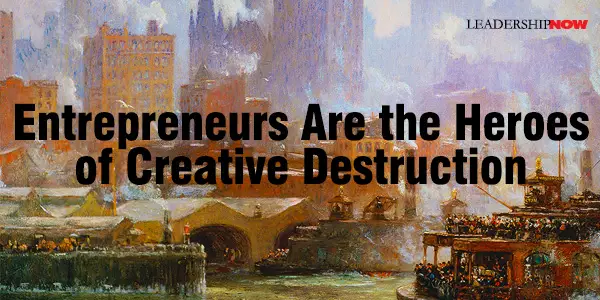 |
 |
03.15.19

Leading Views: Entrepreneurs Are the Heroes of Creative Destruction
In this chronological account beginning with the American Revolution, the genius of America’s innovative success is not only its tolerance of but also its penchant for creative destruction. Though sometimes painful, it is the driving force of economic progress. The authors talk not only of the familiar product innovation but also America’s process innovation—innovation in management and organizing production. Entrepreneurs drawn from every level of society are the primary drivers of this creative destruction. Associated with openness and opportunity, America produces and draws in more entrepreneurs than anywhere else. Entrepreneurs are the heroes of creative destruction—the people with the ability to feel the future in their bones and bring it into being through sheer force of will and intellect. Entrepreneurs drive long-term growth in productivity by pursuing their dreams of building a business, launching a product, or, human nature being what it is, making a fortune. But they are seldom the easiest of heroes, or the nicest. They are almost always guilty of what might be termed imperialism of the soul: they will sacrifice anything, from their own peace of mind to the lives of those around them, to build a business empire and then protect that business empire from destruction. Great entrepreneurs are never at rest; they must keep building and innovating in order to survive. They are also prone to what Norwegians call Stormannsgalskap, or the “madness of great men.” 
Posted by Michael McKinney at 12:54 AM
|
BUILD YOUR KNOWLEDGE
 

How to Do Your Start-Up Right STRAIGHT TALK FOR START-UPS 
Grow Your Leadership Skills NEW AND UPCOMING LEADERSHIP BOOKS 
Leadership Minute BITE-SIZE CONCEPTS YOU CAN CHEW ON 
Classic Leadership Books BOOKS TO READ BEFORE YOU LEAD |